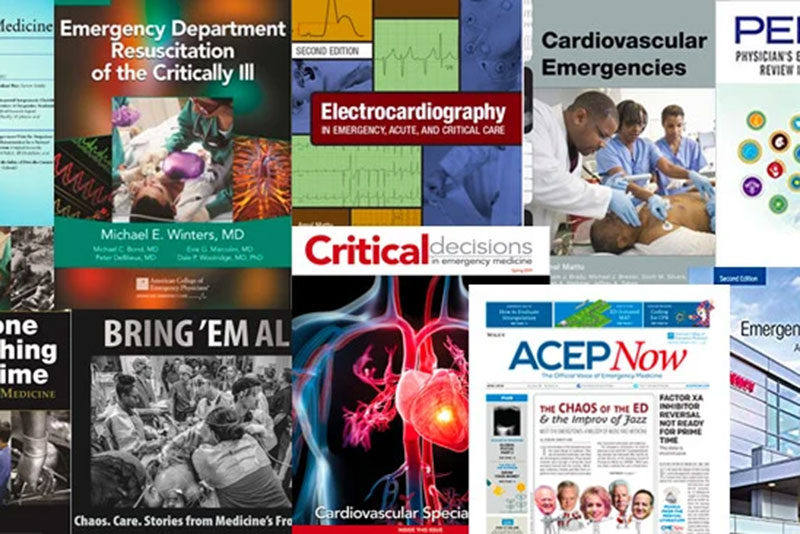Access ACEP Resources

ACEP Anytime
Watch and listen to all of the top tier medical education content and earn your CME from ACEP Anytime – anywhere, anytime.

Clinical Policies
Find ACEP’s guidance on managing emergency department patients, developed using nationally recognized guideline standards.
CME Tracker
Make purchases, register for meetings, access CME certificates and more. Membership is not required to create an account.

EM Data Institute
The EM Data Institute draws data from across ACEP’s products and presents them in a sophisticated analytics platform.

engagED Online Community
Discover your communities. Join the conversation. Share your expertise.

Explore All Member Benefits
As you serve the most vulnerable of the population, ACEP is here to support, protect and empower all emergency physicians.

Journals and Publications
The best reads in emergency medicine are just a click away.

Online Store
Our one-stop shop for the latest books, gifts and apparel.

Podcasts and Apps
The ACEP app is here to give you what you need, when you need it. Most of ACEP’s podcasts are on a variety of audio platforms.

Point-of-Care Tools
We’ve recruited the field’s top experts and thought-leaders to develop tools our members can trust and deploy in the clinical setting.

Scientific Assembly
ACEP25 is more than just education – it’s an opportunity to connect, recharge, and grow with your EM community.

Sections of Membership
Network with other experts in the diverse areas of emergency medicine and find your niche!
Legislative Initiatives
Legislative and Advocacy Update
On June 27, 2024, the United States Supreme Court temporarily restored the Emergency Medical Treatment and Labor Act (EMTALA) exception to Idaho’s abortion ban. In the case Moyle v. US and Idaho v. US, the U.S. Justice Department challenged Idaho’s abortion ban, contending the law violates the federal EMTALA law, requiring physicians to provide care in emergency situations where a woman’s health was at serious risk. The court didn’t rule on the question whether EMTALA supersedes the Idaho law or of emergency abortion access; rather, the 6-3 decision states that the high court took the case too early in the process and should have left the question to lower courts, essentially dismissing the case. Now, the case will be heard by the Ninth Circuit Court of Appeals, which was scheduled to hold hearings earlier this year before the Supreme Court took the case. The high court’s action also reinstated the EMTALA injunction, which means Idaho physicians can provide necessary care, including abortions for high-risk pregnancies in emergency rooms, in order to protect the mother’s health. We will be watching for how this continues to play out in the courts and the coming legislative session.
Minor Consent Law: Effective July 1, 2024, Idaho healthcare providers must obtain parental consent to treat unemancipated minors or face civil liability except in emergency cases. In addition, parents will have a right to access the medical records of their minor children subject to very limited exceptions. This is a significant change in the current law and will require healthcare providers to adjust their current policies and practices. The statute must be read and applied in conjunction with Idaho’s general consent statutes, I.C. § 39-4501 et seq.
Holland and Hart has a great resource on the new law: https://www.hollandhart.com/blanket-consents-under-idahos-new-minor-consent-law
Protective Placement Holds: Starting October 1, 2024, a new law goes into effect that pertains to patients with Neurocognitive Disorders. This legislation (S1247) introduces a framework for neurocognitive holds for patients experiencing acute neurocognitive disorders, such as severe dementia or traumatic brain injury or an acute crisis that is a result of an underlying neurocognitive disorder and not a behavioral health disorder. It allows for temporary holds to ensure patient and public safety while appropriate long-term care plans are developed. This measure is designed to provide a safer environment for these vulnerable patients and those around them. This hold can be started in the community by police, crisis response workers or physicians. The hold is only for 24 hours but can be lifted prior to that by physicians if the acute crisis has resolved and a safety plan is met. There will be continued education put forth by the Department of Idaho Health and Welfare on this as the law goes into effect.
© 2025 American College of Emergency Physicians.
Privacy Policy and Terms of Use
How to Contact ACEP
National ACEP Headquarters
Phone: 800-798-1822
Email: [email protected]

